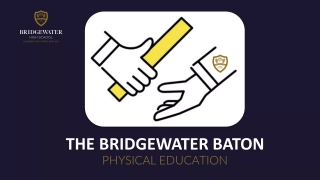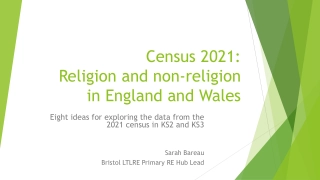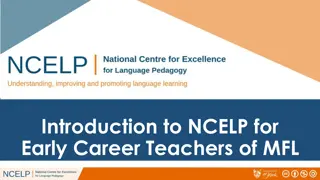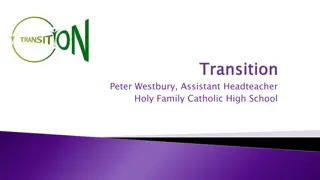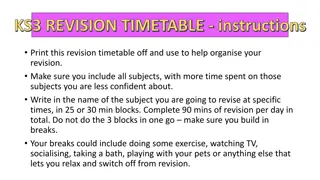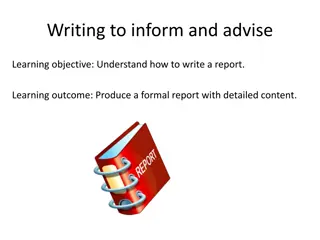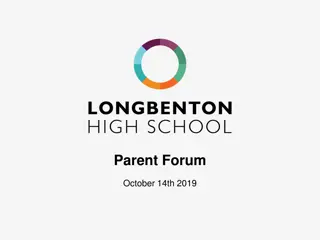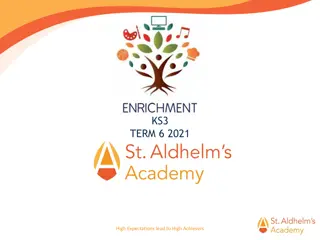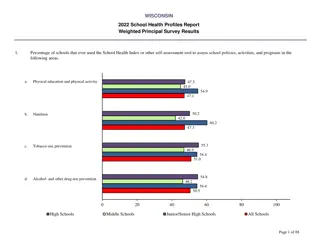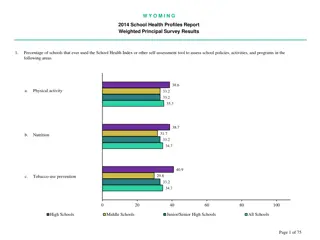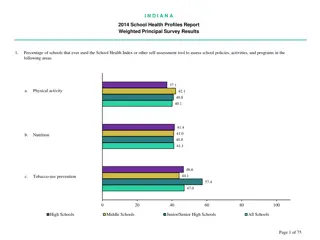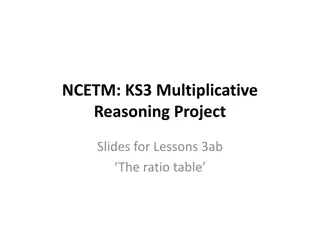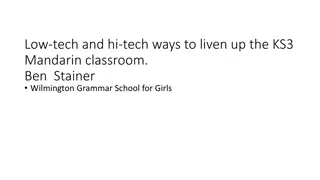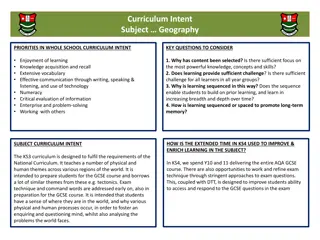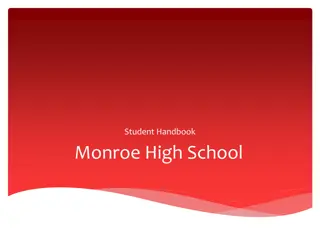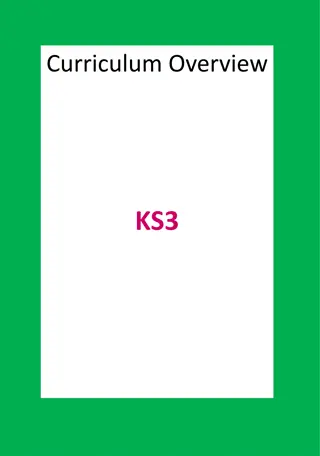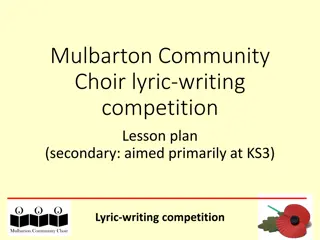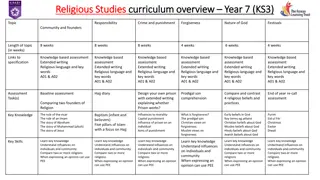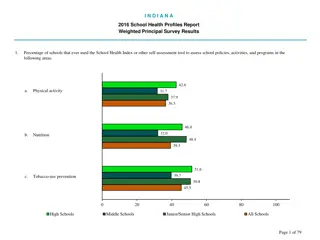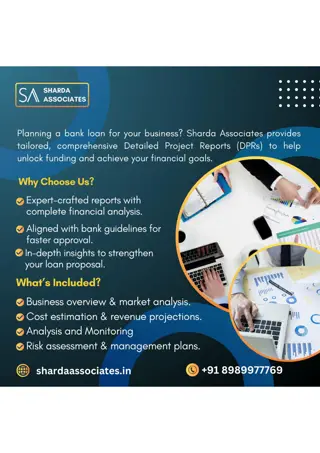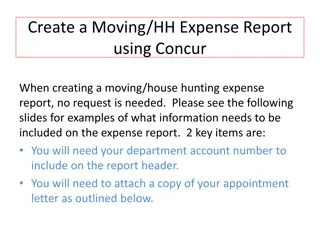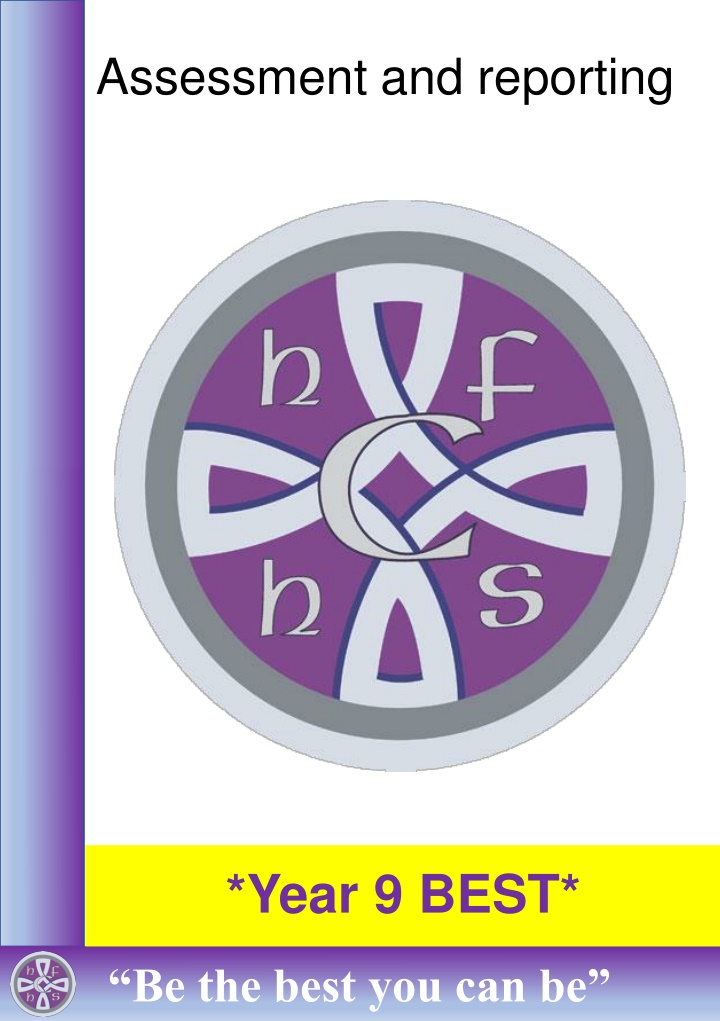
Assessment and Reporting for Year 9 Students
Explore the Assessment and Reporting guide for Year 9 students, focusing on areas of strength and development. Discover the BEST Curriculum tailored for individualized learning, reading support strategies, and the importance of knowledge and assessment.
Download Presentation

Please find below an Image/Link to download the presentation.
The content on the website is provided AS IS for your information and personal use only. It may not be sold, licensed, or shared on other websites without obtaining consent from the author. If you encounter any issues during the download, it is possible that the publisher has removed the file from their server.
You are allowed to download the files provided on this website for personal or commercial use, subject to the condition that they are used lawfully. All files are the property of their respective owners.
The content on the website is provided AS IS for your information and personal use only. It may not be sold, licensed, or shared on other websites without obtaining consent from the author.
E N D
Presentation Transcript
Assessment and reporting *Year 9 BEST* Be the best you can be Be the best you can be
Introduction This guide accompanies your child s report which shows areas of strength and areas for development. We anticipate that parents will help their child work on the areas for development. In this guide, teachers have included links to websites and other supporting documents including the subject curriculum map. The importance of knowledge Following the National Curriculum, each subject leader has developed a rich and broad curriculum. The teachers have identified essential knowledge that pupils need to know at each stage to be able to make progress and sequenced this into a Curriculum Map. These are available on our website. The importance of assessment Valid and reliable assessment will inform teachers about how well pupils in their class have learnt the knowledge needed for each stage. Frequent, well designed assessment should allow pupils to show how well they have learnt the essential knowledge that has been taught. Pupils need to understand but also remember knowledge in the long term in order to make progress. This is why, twice a year, pupils are also given a longer summative assessment to check what they can remember. Assessment data will inform teachers and pupils about strengths in their understanding and gaps in their knowledge. This will allow both teacher and pupil to focus on areas for improvement. Be the best you can be Be the best you can be
The BEST Curriculum Bespoke Education Skills and Teaching Every subject specific curriculum is a planned progression model with knowledge built in sequenced lesson by lesson, topic by topic and year by year. For all pupils, this progression builds upon prior knowledge and reflects pupil starting points. For some pupils, the transition to a mainstream secondary school can be a significant jump. They are not yet ready to start the full secondary programme of study. To support these pupils, some knowledge from KS1 and KS2 needs to be revisited and additional scaffolding is needed with reading, vocabulary and numeracy. To this end, BEST Base pupils follow a bespoke curriculum in English, Mathematics, Science, R.E, History, Geography and Spanish. In these subjects, specialist teachers have adapted the subject curriculum map to meet the needs of the pupils. Therefore, the information in this booklet is tailored to this adapted curriculum. In Best lessons, the assessment principles mean that progress towards knowledge is regularly checked to allow the teacher to plan for progression and build depth lesson by lesson. Progress is measured in relation to the these subject stepping stones. For more information, please email Mrs Samra k.samra@holyfamilyhighschool.co.uk Be the best you can be Be the best you can be
Reading support The importance of reading confidently and fluently cannot be understated. At Holy Family we provide a range of reading opportunities and interventions as follows: Weekly Reading Lessons One lesson per week is dedicated to developing a love of reading in all pupils. Pupils read whole novels, interesting non-fiction and access books that can be loaned. Fresh Start Phonics Where the reading assessment has identified decoding as an area for development, pupils may take part in the Ruth Miskin Secondary School Fresh Start reading programme. Small Group Guided Reading Some pupils access a short programme of group guided reading activities in form time. Some of our reading coaches are teaching assistants or sixth form pupils who have been trained to deliver these programmes. Bedrock Learning (online) All pupils have access to the Bedrock Learning online reading programme. Regular Reading Assessment At Holy Family we use a combination of Salford Reading Test and the GL-Assessment National Group Reading Test. If you would like more information on reading intervention, please email Mrs Samra k.samra@holyfamilyhighschool.co.uk or for information about reading for pleasure, the reading room or enrichment please email Miss Routledge. A.routledge@holyfamilyhighschool.co.uk Be the best you can be Be the best you can be
Understanding your childs report The report contains information as follows: Attendance and late to registration. Reading age indicator Reading lesson summary Personal Development summary Subject information including: Teacher name Attitude to learning score 1-4 Effort score 1-4 Homework score 1-4. Pupils need to attend school regularly for optimum progress. Where attendance is low or inconsistent, this will negatively impact learning, progress and assessment scores. More information about the scoring scale 1-4 and the individual subject assessments are contained in this booklet and the accompanying letter. Be the best you can be Be the best you can be
ATL Scale Attitude to Learning This pupil.. is always well organised and arrives at lessons ready to learn fully engages on all tasks and completes work to the best of their ability works well with peers and makes positive contributions to the lesson 1 This pupil.. is usually organised and usually arrives at lessons ready to learn usually engages on all tasks and often completes work to the best of their ability contributes constructively when working with peers 2 This pupil.. often fails to prepare and arrives to lessons not ready to learn rarely engages on tasks or completes work to the best of their ability needs encouragement to stay on task when working with peers and can distract others 3 This pupil.. regularly fails to attend lessons prepared and ready to learn regularly fails to engage on tasks or to complete work rarely works effectively with peers and can frequently distract others 4 Be the best you can be Be the best you can be
Effort Scale Effort This pupil.. Is always well organised and arrives at lessons ready to learn Fully engages on all tasks and completes work to the best of their ability Works well with peers and makes positive contributions to the lesson Always gives their full effort to their work. 1 This pupil.. Is usually organised and usually arrives at lessons ready to learn Usually engages on all tasks and often completes work to the best of their ability Contributes constructively when working with peers Usually gives their full effort to their work. 2 This pupil.. Often fails to prepare and arrives to lessons not ready to learn Rarely engages on tasks or completes work to the best of their ability Needs encouragement to stay on task when working with peers and can distract others Only sometimes gives their full effort to their work. 3 This pupil.. Regularly fails to attend lessons prepared and ready to learn Regularly fails to engage on tasks or to complete work Rarely works effectively with peers and can frequently distract others Regularly fails to give their full effort to their work. 4 Be the best you can be Be the best you can be
Homework Scale Homework This pupil... Completes all homework tasks fully and to the best of their ability. Meets all homework deadlines. Prepares for assessments and exams by revising at home. Always submits merit worthy work of high quality. 1 This pupil... Completes almost all homework tasks fully and to the best of their ability. Meets all homework deadlines. Prepares for assessments and exams by revising at home. Almost always submits work of good quality. 2 This pupil... Often fails to complete homework tasks fully and sometimes does not complete work to the best of their ability Does not meet all homework deadlines. Prepares for some assessments and exams by revising at home, but more effort is required. Rarely submits work when required and it is sometimes not of the required standard. 3 This pupil... Regularly fails to complete homework tasks fully and does not complete work to the best of their ability Regularly fails meet homework deadlines. Does not prepare for assessments and exams and there is very little evidence of revision at home. Regularly fails to submit of the required standard. 4 Be the best you can be Be the best you can be
Art Year 8 Curriculum Art Curriculum Learning Journey - click this link to see our learning journey Formative Assessment All groups in Art are of a mixed ability setting, where a spread of outcomes and ability are the norm. Within the schemes of work teachers use questioning to establish where pupils are at and how much they have learned/understood. Verbal feedback/intervention (individually and as a group) within lessons are critical to improving pupil artwork as it progresses. In addition, pupils assess their own work as part of their Art practice. Pupils also produce written annotations and evaluations, where they assess and critique their own work Summative Assessment Assessment is used in Art to assist pupils in improving their outcomes and in knowing where their individual strengths lie. Work is assessed and monitored throughout a termly project using WAGOLLS to ensure consistency. Throughout the unit pupils work towards shared criteria stated on their assessment sheet, completing self-assessment in line with a teacher assessment. How can my child extend their learning? www.tate.org.uk National Gallery Art and Design Be the best you can be Be the best you can be
Computing Year 8 Curriculum Computing Curriculum Learning Journey - click this link to see our learning journey Formative Assessment pupils are assessed using a combination of baseline tests, teacher-led practical activities, homework and pupil-led personal response activities for each project. Formative assessment also take place in ICT classrooms through the interactions between pupils and teachers in answering questions, working in pairs and through feedback tasks between pupils and teachers. Summative Assessment The Computing assessment was out of 40 marks and used multiple choice, short answer and application style questions. The topics were The Impact of Technology and Computer Networks. How can my child extend their learning? KS3 Computer Science - BBC Bitesize Computing lessons for Key Stage 3 pupils - Oak National Academy Coding Practice - https://studio.code.org/home Be the best you can be Be the best you can be
Design and Technology Year 8 Curriculum DT Curriculum KS3 - click this link to see our learning journey. Formative Assessment Pupils are assessed using a combination of teacher assessment during lessons, through verbal questioning and answers, use of whiteboards, written answers and self-assessment during class activities. Project work is assessed ongoing through the topic. Summative Assessment DT is taught on a carousel with Food Technology. The final summative assessment consists of two parts - the first part consists of a full written assessment under exam conditions made up of questions of the knowledge of the area of DT studied so far. The second part is based on their overall project, including the research, design, development and overall quality of their product. How can my child extend their learning? British Nutrition Foundation Royal Academy of Engineering The Design Museum Fashion and Textiles Museum BBC Design and Technology Be the best you can be Be the best you can be
Drama Year 8 Curriculum Drama Curriculum KS3 - click this link to see our learning journey. Formative Assessment Pupils are assessed using a combination of teacher assessment during lessons. Project work is assessed ongoing through the topic. Summative Assessment The final group performance allows pupils to demonstrate the skills they have developed. How can my child extend their learning? National Theatre BBC Bitesize Be the best you can be Be the best you can be
*English* Year 8 Curriculum English Curriculum KS3 - click this link to see our learning journey. Formative Assessment Pupils are assessed using a combination of low stakes starters and quizzes, in-class questioning and think-pair-share, homework such as Bedrock Learning, Spelling Shed and baseline and formative assessment. Summative Assessment There are two English end of year assessments: reading and writing. The reading test assesses vocabulary, comprehension, key literary concepts and understanding the writer s choice of language. The writing test assesses the pupils ability to write for a specific purpose and audience and marks are also awarded for technical accuracy. How can my child extend their learning? Creative writing - KS2 English - BBC Bitesize Grammar - KS2 English - BBC Bitesize Sentences - KS2 English - BBC Bitesize Spelling - KS2 English - BBC Bitesize Non-fiction - KS2 English - BBC Bitesize Spelling Shed - Spelling Shed - The Science of Spelling Spelling, punctuation and grammar - KS3 English - BBC Bitesize Writing Skills - sentences - BBC Bitesize Be the best you can be Be the best you can be
Food Technology Year 8 Curriculum Food Curriculum - KS3 - click this link to see our learning journey. Formative Assessment Pupils are assessed using a combination of teacher assessment during lessons, through verbal questioning and answers, use of whiteboards, written answers and self-assessment during class activities. Project work is assessed ongoing through the topic. Summative Assessment Food Technology is taught on a carousel with Design Technology. The final summative assessment consists of two parts - the first part consists of a full written assessment under exam conditions made up of questions of the knowledge of the area of Food studied so far. The second part is based on their preparation of the final food dish. How can my child extend their learning? British Nutrition Foundation The Eatwell Guide BBC Design and Technology Be the best you can be Be the best you can be
*Geography* Year 8 Curriculum Geography Curriculum KS3 - click this link to see our learning journey. Formative Assessment Pupils are assessed using a combination of baseline tests, low stake quizzes, think, pair, share, questioning, feedback as well as homework. Summative Assessment The end of year Geography assessment tests a range of the pupils curriculum knowledge and skills. How can my child extend their learning? Mapping the world - BBC Bitesize National Geographic Kids Be the best you can be Be the best you can be
*Maths* Year 8 Curriculum Each pupil follows an individual maths curriculum planned to meet their needs across all strands of mathematics. This ensures they are working at the correct challenge point in each topic and follow a unique learning journey matched to their understanding. Each personalised learning journey begins at the unique starting point of the pupil and is structured to build upon skills and knowledge in sequential order, progressing to build understanding and fluency. At Holy Family High School we use the White Rose Maths curriculum as a basis for our planning. Formative Assessment Pupils are assessed using a combination of half termly check-up tests with detailed feedback to improve, low stakes starters, quizzes and mini whiteboard activities in class. Summative Assessment The end of year maths assessment is split into two sections: fluency and core. Percentages on the report are based on a combination of both sections. How can my child extend their learning? https://whiteroseeducation.com/resources/digital-tools IXL - Sign In Times Tables Rock Stars: Play (ttrockstars.com) Hit the Button - (topmarks.co.uk) Maths Games - Mathsframe Be the best you can be Be the best you can be
Music Year 8 Curriculum Music Curriculum KS3 - click this link to see our learning journey Formative Assessment All groups in Music are of a mixed ability setting, where a spread of outcomes and ability are the norm. A variety of formative assessments are used throughout the year including teacher, self and peer assessment. Assessment is used in Music to assist pupils in improving their outcomes and in knowing where their individual strengths lie. Work is assessed and monitored throughout the year using a variety of activities: call and response, closed and open questioning, verbal feedback, recall quizzes and performances. Verbal feedback (individual and group) is given regularly to allow pupils to improve their progress. Summative Assessment Music is taught with a termly focus. At the end of each focus pupils complete an assessment in the form of a performance or composition. Throughout the unit pupils work towards this using the criteria stated on their assessment sheet and complete a self-assessment. This is then consolidated by the teacher. How can my child extend their learning? Music Theory Exercises BBC Bitesize Music DSO Kids musicca.com Be the best you can be Be the best you can be
Physical Education Year 8 Curriculum PE KS3 Learning Journey - click this link to see our learning journey Formative Assessment All groups in PE are of a mixed ability setting, where a spread of outcomes and ability are the norm. Where possible the groups will be divided up using gold, silver and bronze strands. Within the schemes of work teachers use questioning to establish where pupils are at and how much they have learned/understood. The pupils will be assessed constantly in competitive situations for the teachers to build an assessment level formatively. Verbal feedback/intervention (individually and as a group) within lessons are critical to improving pupil physical literacy. In addition, pupils assess their own work as part of their practical performances. Pupils also evaluate, assess and critique their own work so they know the level that they are working at. Pupil knowledge is assessed through a range of competitive practical activities such as drills and small sided / full games and performances. Pupils are assessed in each activity module of which there are six in the year. Pupils are assessed using age related assessment criteria in PE. The pupils are awarded bronze, silver and gold for their achievement across the strands. Summative Assessment The summative assessment is the final competitive session of the module. The average of these module assessments linked with the formative assessments are used to produce the mark used at the point of reporting to parents/carers. Percentage score linked to medal colour Platinum= 81-100% Gold= 61-80% Silver=41-60% Bronze=21-40% Copper=1-20% How can my child extend their learning? BBC SPORT Oak National Academy Olympics website Wimbledon Tennis Netball Women and girls football The Football Association Basketball Be the best you can be Be the best you can be
*History* Year 8 Curriculum History Curriculum KS3- click this link to see our learning journey. Formative Assessment Pupils are assessed using a combination of baseline tests, low stake quizzes, think, pair, share, questioning, and regular skills based marking points. Homework is set through Classcharts and focuses on key vocabulary, pre- learning and revisiting learning. Summative Assessment The History assessment tests a range of the substantive curriculum including, the disciplinary knowledge of how to use evidence and make judgements. How can my child extend their learning? KS3 History - BBC Bitesize Migration - BBC Teach The Industrial Revolution - BBC Bitesize World War One - KS2 History - BBC Bitesize Horrible Histories - CBBC - BBC Be the best you can be Be the best you can be
PSHE Year 8 Curriculum PSHE Curriculum KS3- click this link to see our learning journey Formative Assessment All PSHE lessons are taught in mixed ability form classes. PSHE education covers issues and areas of life which young people will be affected by in different ways and at different times. As such, we do not carry out any summative assessment and do not use grades to measure progress. Instead, teachers carry out a baseline assessment before teaching anything new. As pupils learning in the three main topics of Living in the Wider World , Health and Wellbeing and Relationships will come from several sources, we can only see whether they have made progress in their learning if we have established the knowledge, understanding, attributes, skills, strategies, beliefs and attitudes they had before any new teaching took place. This baseline assessment is re-visited at the end of the topic. During lessons, a wide variety of strategies are used to assess learning, including; questioning, discussion, role-play, hot- seating, draw and write, freeze-frame and other drama techniques, storyboards/cartoon strip/scenario script writing, responding to a scenario, picture or video clip, self-assessment on continuum scale. How can my child extend their learning? BBC Teach Relationships Education BBC Citizenship Young Minds Be the best you can be Be the best you can be
*Religious Education* Year 8 Curriculum Religious Education Curriculum KS3 - click this link to see our learning journey. Formative Assessment Pupils are assessed using a combination of end of unit tests with detailed feedback to improve, low stakes starters and mini whiteboard activities in class. Summative Assessment The Religious Education assessment checks pupils knowledge and understanding of key topics and themes. How can my child extend their learning? Animate Youth KS3 Religious Studies - BBC Bitesize Education (cafod.org.uk) Be the best you can be Be the best you can be
*Science* Year 8 Curriculum Science Curriculum KS3 - click this link to see our learning journey. Formative Assessment Pupils are assessed using a combination of teacher assessment during lessons, through verbal questioning and answers, use of whiteboards, written answers and self-assessment during class activities. Summative Assessment The Science assessment checks pupils knowledge and understanding of key topics and themes. How can my child extend their learning? BBC Bitesize KS2 Science - BBC Bitesize Fun Quizzes to Help You Learn Quicker (educationquizzes.com) National Geographic Be the best you can be Be the best you can be
*Spanish* Year 8 Curriculum Spanish Curriculum KS3 - click this link to see our learning journey. Formative Assessment Pupils follow a bespoke Spanish curriculum planned to meet their needs across all the four skills (listening, speaking, reading and writing). Pupils are assessed using a combination of games, low stake quizzes, think, pair, share, questioning, live feedback as well as online homework games. Summative Assessment The end of year Spanish assessment tests a range of the pupils vocabulary knowledge within the four key skills and progress is measured through a tracked percentage as they move through the curriculum. How can my child extend their learning? Language Gym BBC Bitesize - KS3 Spanish Be the best you can be Be the best you can be
Pupils are asked to complete two Bedrock lessons as homework in English each week. Bedrock makes it possible to ensure regular reading of culturally enriching texts, while also improving reading fluency and comprehension. Vocabulary and grammar are learned while reading rich, interesting texts. The texts are a mix of fiction and non-fiction from a wide range of topics and they are read aloud so that pupils can hear expert reading. Parents should create their own account through the Guardian signup tab using the access code provided by school. app.bedrocklearning.org. Please contact Mrs. Leonowicz if you would like support downloading and using the Bedrock app on this email: j.leonowicz@holyfamilyhighschool.co.uk Be the best you can be Be the best you can be
Notes Be the best you can be Be the best you can be

